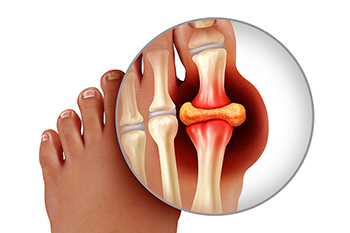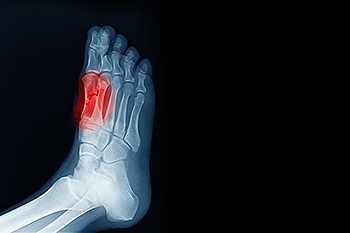

Ankle fractures occur when one or more of the bones that form the ankle joint break due to sudden or excessive force. Car accidents are a common cause, as the impact can twist or crush the ankle unexpectedly. Falling and tripping, especially on uneven surfaces, often result in awkward landings that place too much stress on the joint. Simple missteps, such as missing a curb or stepping wrong on a slope, can also lead to fractures. Overuse injuries, particularly in athletes, may weaken the bones over time, making them more vulnerable to breaks. Another frequent cause is falling from a height, such as slipping off a ladder, where the force of landing improperly can easily fracture the ankle. If you have fractured your ankle, it is suggested that you contact a podiatrist who can offer appropriate treatment solutions.
Broken ankles need immediate treatment. If you are seeking treatment, contact one of our podiatrists from Grand Blanc Family Footcare. Our doctors can provide the care you need to keep you pain-free and on your feet.
Broken Ankles
A broken ankle is experienced when a person fractures their tibia or fibula in the lower leg and ankle area. Both of these bones are attached at the bottom of the leg and combine to form what we know to be our ankle.
When a physician is referring to a break of the ankle, he or she is usually referring to a break in the area where the tibia and fibula are joined to create our ankle joint. Ankles are more prone to fractures because the ankle is an area that suffers a lot of pressure and stress. There are some obvious signs when a person experiences a fractured ankle, and the following symptoms may be present.
Symptoms of a Fractured Ankle
If you suspect an ankle fracture, it is recommended to seek treatment as soon as possible. The sooner you have your podiatrist diagnose the fracture, the quicker you’ll be on the way towards recovery.
If you have any questions, please feel free to contact our office located in Grand Blanc, MI . We offer the newest diagnostic and treatment technologies for all your foot care needs.

Gout is a form of inflammatory arthritis that often affects the joints of the toes, particularly the big toe. This happens when excess uric acid in the blood forms sharp crystals that deposit in the joints, leading to sudden and intense pain, swelling, and redness. Several factors contribute to high levels of uric acid. Dietary triggers such as red meat, seafood, and alcohol can increase uric acid production. Genetic factors also play a role, making some individuals more prone to developing gout. Certain medical conditions, including kidney disease, high blood pressure, and diabetes, can interfere with uric acid removal. A sedentary lifestyle or obesity further increase the risk. The toes are especially vulnerable due to their cooler temperature, which encourages crystal formation in that area. If you have symptoms of gout, it is suggested that you promptly contact a podiatrist who can help you to manage this painful condition.
Gout is a painful condition that can be treated. If you are seeking treatment, contact one of our podiatrists from Grand Blanc Family Footcare. Our doctors will treat your foot and ankle needs.
What Is Gout?
Gout is a form of arthritis that is characterized by sudden, severe attacks of pain, redness, and tenderness in the joints. The condition usually affects the joint at the base of the big toe. A gout attack can occur at any random time, such as the middle of the night while you are asleep.
Symptoms
Risk Factors
Prior to visiting your podiatrist to receive treatment for gout, there are a few things you should do beforehand. If you have gout you should write down your symptoms--including when they started and how often you experience them, important medical information you may have, and any questions you may have. Writing down these three things will help your podiatrist in assessing your specific situation so that he or she may provide the best route of treatment for you.
If you have any questions, please feel free to contact our office located in Grand Blanc, MI . We offer the newest diagnostic and treatment technologies for all your foot care needs.

Sesamoiditis is an inflammatory condition that affects the small sesamoid bones beneath the big toe joint, often causing pain at the ball of the foot. These bones act like pulleys, helping the tendons move smoothly and bear the stress of walking, running, or jumping. When repetitive pressure or trauma irritates the area, pain can develop beneath the big toe, especially when bending or pushing off the foot. Symptoms of sesamoiditis include swelling, tenderness, and difficulty walking, sometimes leading to a limping gait to avoid pressure on the forefoot. Although sesamoiditis is not life-threatening, it can disrupt daily activities. A podiatrist can confirm the diagnosis, recommend footwear modifications, and may prescribe custom orthotics to relieve pressure on the joint. Further treatment such as immobilization or surgery may be necessary in severe cases. If you are experiencing pain beneath your big toe, it is suggested that you make an appointment with a podiatrist for a diagnosis and treatment.
Sesamoiditis is an unpleasant foot condition characterized by pain in the balls of the feet. If you think you’re struggling with sesamoiditis, contact one of our podiatrists of Grand Blanc Family Footcare. Our doctors will treat your condition thoroughly and effectively.
Sesamoiditis
Sesamoiditis is a condition of the foot that affects the ball of the foot. It is more common in younger people than it is in older people. It can also occur with people who have begun a new exercise program, since their bodies are adjusting to the new physical regimen. Pain may also be caused by the inflammation of tendons surrounding the bones. It is important to seek treatment in its early stages because if you ignore the pain, this condition can lead to more serious problems such as severe irritation and bone fractures.
Causes of Sesamoiditis
Treatment for sesamoiditis is non-invasive and simple. Doctors may recommend a strict rest period where the patient forgoes most physical activity. This will help give the patient time to heal their feet through limited activity. For serious cases, it is best to speak with your doctor to determine a treatment option that will help your specific needs.
If you have any questions please feel free to contact our office located in Grand Blanc, MI . We offer the newest diagnostic and treatment technologies for all your foot and ankle needs.